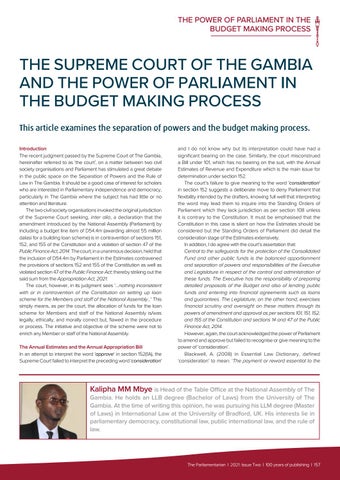THE POWER OF PARLIAMENT IN THE BUDGET MAKING PROCESS
THE SUPREME COURT OF THE GAMBIA AND THE POWER OF PARLIAMENT IN THE BUDGET MAKING PROCESS This article examines the separation of powers and the budget making process. Introduction The recent judgment passed by the Supreme Court of The Gambia, hereinafter referred to as ‘the court’, on a matter between two civil society organisations and Parliament has stimulated a great debate in the public space on the Separation of Powers and the Rule of Law in The Gambia. It should be a good case of interest for scholars who are interested in Parliamentary independence and democracy, particularly in The Gambia where the subject has had little or no attention and literature. The two civil society organisations invoked the original jurisdiction of the Supreme Court seeking, inter alia, a declaration that the amendment introduced by the National Assembly (Parliament) by including a budget line item of D54.4m (awarding almost 55 million dalasi for a building loan scheme) is in contravention of sections 151, 152, and 155 of the Constitution and a violation of section 47 of the Public Finance Act, 2014. The court, in a unanimous decision, held that the inclusion of D54.4m by Parliament in the Estimates contravened the provisions of sections 152 and 155 of the Constitution as well as violated section 47 of the Public Finance Act; thereby striking out the said sum from the Appropriation Act, 2021. The court, however, in its judgment sees ‘…nothing inconsistent with or in contravention of the Constitution on setting up loan scheme for the Members and staff of the National Assembly...' This simply means, as per the court, the allocation of funds for the loan scheme for Members and staff of the National Assembly is/was legally, ethically, and morally correct but, flawed in the procedure or process. The initiative and objective of the scheme were not to enrich any Member or staff of the National Assembly. The Annual Estimates and the Annual Appropriation Bill In an attempt to interpret the word 'approve' in section 152(1A), the Supreme Court failed to interpret the preceding word 'consideration'
and I do not know why but its interpretation could have had a significant bearing on the case. Similarly, the court misconstrued a Bill under 101, which has no bearing on the suit, with the Annual Estimates of Revenue and Expenditure which is the main issue for determination under section 152. The court’s failure to give meaning to the word 'consideration' in section 152 suggests a deliberate move to deny Parliament that flexibility intended by the drafters, knowing full well that interpreting the word may lead them to inquire into the Standing Orders of Parliament which they lack jurisdiction as per section 108 unless it is contrary to the Constitution. It must be emphasised that the Constitution in this case is silent on how the Estimates should be considered but the Standing Orders of Parliament did detail the consideration stage of the Estimates extensively. In addition, I do agree with the court’s assertation that: Central to the safeguards for the protection of the Consolidated Fund and other public funds is the balanced apportionment and separation of powers and responsibilities of the Executive and Legislature in respect of the control and administration of these funds. The Executive has the responsibility of preparing detailed proposals of the Budget and also of lending public funds and entering into financial agreements such as loans and guarantees. The Legislature, on the other hand, exercises financial scrutiny and oversight on these matters through its powers of amendment and approval as per sections 101, 151, 152, and 155 of the Constitution and sections 14 and 47 of the Public Finance Act, 2014. However, again, the court acknowledged the power of Parliament to amend and approve but failed to recognise or give meaning to the power of ‘consideration’. Blackwell, A. (2008) in Essential Law Dictionary, defined ‘consideration’ to mean: ‘The payment or reward essential to the
Kalipha MM Mbye is Head of the Table Office at the National Assembly of The
Gambia. He holds an LLB degree (Bachelor of Laws) from the University of The Gambia. At the time of writing this opinion, he was pursuing his LLM degree (Master of Laws) in International Law at the University of Bradford, UK. His interests lie in parliamentary democracy, constitutional law, public international law, and the rule of law.
The Parliamentarian | 2021: Issue Two | 100 years of publishing | 157






